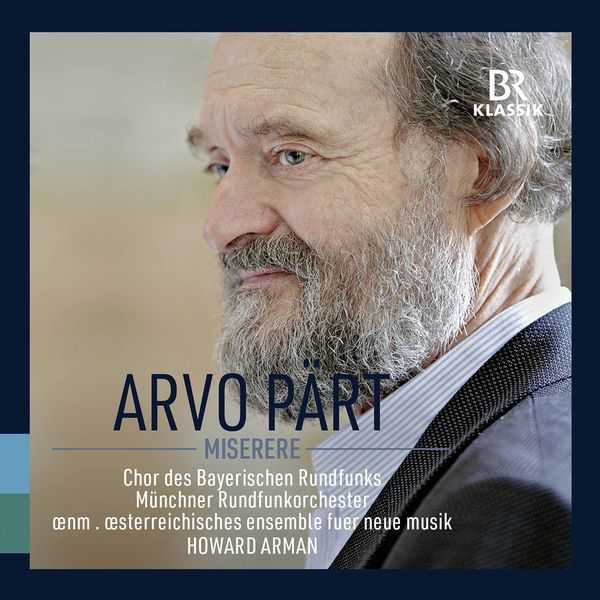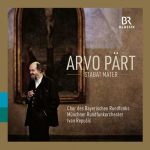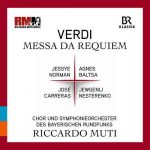

Composer: Arvo Pärt
Performer: Chor des Bayerischen Rundfunks
Conductor: Howard Arman
Format: FLAC (tracks)
Label: BR Klassik
Catalogue: 900527
Release: 2021
Size: 695 MB
Recovery: +3%
Scan: yes
01. Which was the son of…
02. Festina lente
03. Tribute to Caesar
04. Sequentia (Revised 2019 Version)
05. The Deer’s Cry
Miserere (Live)
06. Versus No. 3, Miserere mei
07. Versus No. 4, Amplius lava me ab iniquitate mea
08. Versus No. 5, Quoniam iniquitatem
09. Dies irae
10. Versus No. 6, Tibi soli peccavi
11. Versus No. 7, Ecce enim in inquitatibus
12. Versus No. 8, Ecce enim veritatem dilexisti
13. Versus No. 9, Asperges me hyssopo
14. Versus No. 10, Auditui meo dabis
15. Versus No. 11, Averte faciem tuam a peccatis meis
16. Versus No. 12, Cor mundum crea in me, Deus
17. Versus No. 13, Ne proiicias me a facie tua
18. Versus No. 14, Redde mihi laetitiam
19. Versus No. 15, Docebo iniquos vias tuas
20. Versus No. 16, Libera me de sanguinibus
21. Versus No. 17, Domine, labia mea aperies
22. Versus No. 18, Quoniam si voluisses sacrificium
23. Versus No, 19, Sacrificium Deo spiritus contribulatus
24. Versus No. 20, Benigne fac
25. Versus No. 21, Tunc acceptabis sacrificium
26. Rex tremendae
27. And I Heard a Voice…
The Estonian composer Arvo Pärt, born in 1935, has succeeded in bringing sacred music back to a broader audience, and away from the confines of the church service, more than almost any other contemporary composer. The meditative character of his works, and his return to the simplest and most basic musical forms, convey moments of intense spirituality. Before his emigration from the Soviet Union, Pärt had already invented what he termed the “tintinnabuli” style of composition. He produced an early and important example of this expressive style in 1977 with his Cantus in Memory of Benjamin Britten, scored for string orchestra and bell. It is also a key feature of the choral and instrumental works presented by BR-Klassik on this new album: five works for choir as well as two for instrumental ensemble, covering all of the composer’s creative epochs between 1986 and 2019.
Alongside shorter a cappella choral works such as Tribute to Caesar (1997), Which Was the Son of… (2000), The Deer’s Cry (2007) and Ja ma kuulsin hääle… (2017), the highlight of this album – almost 30 minutes in length and with its absolutely spectacular sound effects – is the Miserere for soli, mixed voices, ensemble and organ (1989/1992).
Ever since its premiere in 1989 in Rouen, France, and the recording by the Hilliard Ensemble under Paul Hillier, this is the first time a professional choir has dared undertake a production of this masterful composition – a work conveying the growth, flourishing and transience of human existence in sound. Arvo Pärt had never heard some of these pieces sung by a full choir before – “always only by a small ensemble”. The impressive programme is rounded off by two instrumental works: Festina lente (1986/1990) for string orchestra and harp, and Sequentia (2014/2019) for violin, percussion and string orchestra.
On the occasion of the 85th birthday of Arvo Pärt (September 2020) and the 75th anniversary of the Bavarian Radio Chorus (May 2021). The Estonian composer Arvo Pärt, born in 1935, has succeeded in bringing sacred music back to a broader audience, and away from the confines of the church service, more than almost any other contemporary composer. The meditative character of his works, and his return to the simplest and most basic musical forms, convey moments of intense spirituality. Before his emigration from the Soviet Union, Pärt had already invented what he termed the tintinnabuli style of composition (from the Latin word for a bell). He produced an early and important example of this expressive style in 1977 with his “Cantus in Memory of Benjamin Britten”, scored for string orchestra and bell. It is also a key feature of the choral and instrumental works presented by BR-KLASSIK on this new CD: five works for choir as well as two for instrumental ensemble, covering all of the composer’s creative epochs between 1986 and 2019. Alongside shorter acappella choral works such as “Tribute to Caesar” (1997), “Which Was the Son of…” (2000), “The Deer’s Cry” (2007) and “Ja ma kuulsin hääle… (And I heard a voice)” (2017), the highlight of this album – almost 30 minutes in length and with its absolutely spectacular sound effects – is the “Miserere” for soli, mixed voices, ensemble and organ (1989/1992).



